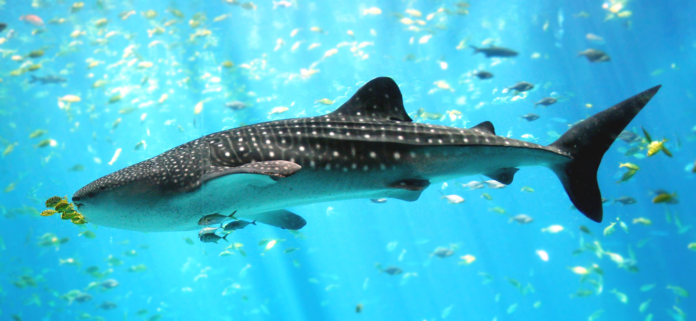By Sophia Byl
The thought of a creature with teeth coating its skin and eyeballs is a concept that’ll create some bone-chilling (tooth-chilling?) mental images. Some kind of fantastical goblin, perhaps? A mutant porcupine? There’s no need to test the limits of your imagination and mental well-being in this case: whale sharks fit this description perfectly. Like all sharks, whale sharks have skin teeth known as “dermal denticles”; think serrated scales, shaped like arrowheads and aiding in the shark’s ability to swim quickly and quietly. The whale shark, which, contrary to its colossally fearful appearance, is actually a peaceful filter feeder, takes things a step further. Each of its eyeballs can have more than 3,000 tooth-like denticles, which serve to protect the shark’s eyes similarly to how our eyelids and eyelashes shield our eyes from harm.
Sharks’ strange uses for teeth don’t stop with the whale shark, either. Just this past July, a new species of shark was discovered off the coasts of New Zealand: the roughback bristle shark, named for its oddly bristle-textured dermal denticles. Scientists determined that this shark was not only a new species, but the first species in an entirely new taxonomic family of sharks, with possibilities for many more species to be discovered in the future.
Shark science is, as any branch of zoology, a constantly growing field with lots of research to be done. The big issue is the social stigma that sharks face now, thanks to movies and other media villainizing them with portrayals of bloodthirsty killers. People have sworn off going to the beach in fear of being dragged into the sea by a pair of hungry shark jaws, when statistically, you are more likely to die from a vending machine than a shark attack. (For the perpetually curious: most vending machine deaths are caused by an impatient customer rocking the machine back and forth and having it topple onto them, squishing them like a bug. There was one recorded case of a man tragically dying after his attempt to blow up the machine backfired, but was that really the machine’s fault, or his own? Your choice.)
Sharks are truly fascinating yet vulnerable creatures, and they play essential roles in many marine ecosystems. Without sharks, there are no beautiful coral reefs, none of those cute little marine creatures or colorful fish. Thankfully, there are many efforts dedicated towards raising shark awesomeness awareness. Shark Angels is one example of a shark conservation non-profit that aims to “turn fear into fascination” – they have volunteer opportunities for college students, so if marine biology is something you see in your future, Shark Angels has graphic design, journalism, and social media manager openings for you!
Another lovely source for all things shark science is Jaida Elcock, a marine biology PhD candidate at the University of Washington’s School of Aquatic and Fisheries Science and a shark expert! She recently did a couple of collab videos with legendary science guy Hank Green over on his personal YouTube channel, in which they discussed both shark facts and hypotheticals (What if sharks had hands? Would we all be doomed?) Jaida’s YouTube and Instagram accounts are both @sofishtication_, so check her stuff out if you’d like to learn more about any sort of shark stuff.

